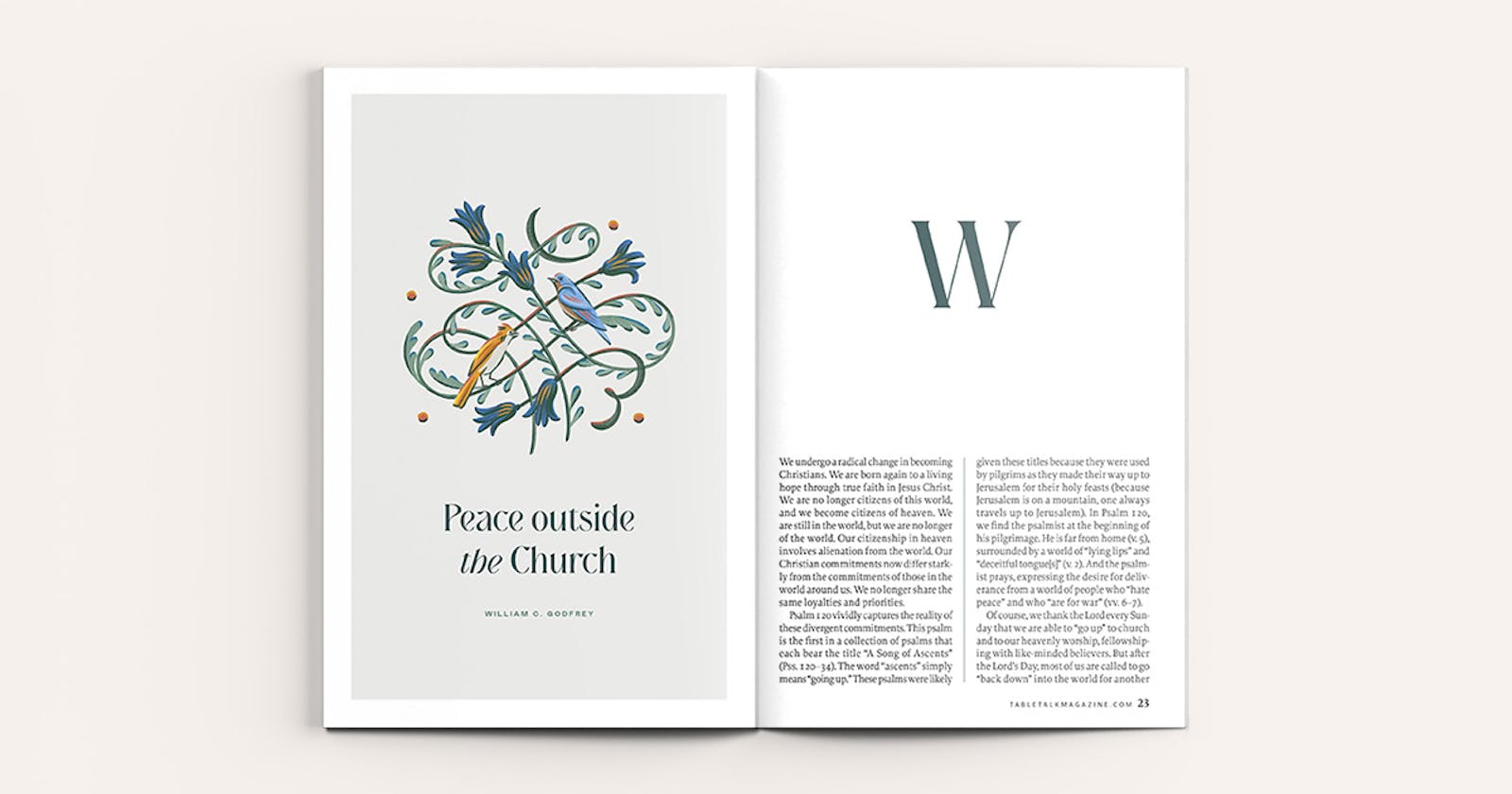
Request your free, three-month trial to Tabletalk magazine. You’ll receive the print issue monthly and gain immediate digital access to decades of archives. This trial is risk-free. No credit card required.
Try Tabletalk NowAlready receive Tabletalk magazine every month?
Verify your email address to gain unlimited access.
We undergo a radical change in becoming Christians. We are born again to a living hope through true faith in Jesus Christ. We are no longer citizens of this world, and we become citizens of heaven. We are still in the world, but we are no longer of the world. Our citizenship in heaven involves alienation from the world. Our Christian commitments now differ starkly from the commitments of those in the world around us. We no longer share the same loyalties and priorities.
Psalm 120 vividly captures the reality of these divergent commitments. This psalm is the first in a collection of psalms that each bear the title “A Song of Ascents” (Pss. 120–34). The word “ascents” simply means “going up.” These psalms were likely given these titles because they were used by pilgrims as they made their way up to Jerusalem for their holy feasts (because Jerusalem is on a mountain, one always travels up to Jerusalem). In Psalm 120, we find the psalmist at the beginning of his pilgrimage. He is far from home (Ps. 120:5), surrounded by a world of “lying lips” and “deceitful tongue[s]” (Ps. 120:2). And the psalmist prays, expressing the desire for deliverance from a world of people who “hate peace” and who “are for war” (Ps. 120:6–7).
Of course, we thank the Lord every Sunday that we are able to “go up” to church and to our heavenly worship, fellowshipping with like-minded believers. But after the Lord’s Day, most of us are called to go “back down” into the world for another six days. Our jobs, our schools, our volunteer and recreational pursuits, even our digital and social media activities bring us into contact with the world. So how can we bring the peace of Christ to bear on a world that hates peace?
God’s people must begin with the calling we have received in Romans 12:18: “If possible, so far as it depends on you, live peaceably with all.” This is an important passage because it reminds us of our God-given responsibility. We are to do what we can to live peaceably with all, including with the world. Wherever Christians can make peace without compromising godliness, we ought to do it.
In the first place, we live peaceably when we strive not to be the ones who interrupt the peace. Peace is an aspect of the fruit of the Spirit (Gal. 5:22) and a characteristic of the wisdom that is from above (James 3:17). Psalm 120 reminds us that the world hates peace and is war-mongering. The hatred of peace and love of war are characteristics of the sin-cursed flesh and manifest themselves in enmity, strife, rivalries, dissensions, and divisions (Gal. 5:19–20). What Samuel Miller said to his incoming divinity students about their conduct in the church certainly applies to all Christians and their conduct with the world: If war is made and peace is broken, “see to it that none of you be found among the workers of the mischief. . . . Do not lend your influence to the unhallowed work of corrupting and dividing.” Our God-given responsibility to live peaceably begins with not being the ones who break peace by our sinful conduct.
This does not mean that we seek to maintain peace with the world at all costs. To do so would be to abandon our other important God-given responsibilities. The Holy Spirit tells us clearly to live peaceably “if possible.” It is not possible to make peace with the world when it makes war against the living God. So how do we walk that tightrope faithfully, maintaining the peace where we should while not compromising where we should not? Again, Miller’s advice is helpful: “See to it that you unceasingly seek not ‘your own things’ (cf. Phil. 2:21), your own aggrandizement, your own honor, your own fancies, or your own speculations, but ‘the things which are Jesus Christ’s.’ ” When it comes to assessing how to maintain peace with the world, we should simply ask, “Am I seeking my own things or the things of Christ?” It is not worthwhile for me to make war with the world based on the things that are only mine, such as my reputation, honor, opinions, or thoughts. But we cannot compromise with the world over the things that are Christ’s, such as His law, His wisdom, His gospel, and His glory.

Living peaceably means not only that we seek to maintain the peace but also that we seek to mend the peace when it is fractured. Here, we must be cognizant of our God-ordained limitations and our God-given responsibilities. Romans 12:18 acknowledges that peace does not depend solely on us. We are to pursue peace “if possible, so far as it depends on [us].” These words contain both an explicit responsibility and an implicit limitation. Explicitly, we are to pursue peace by living peaceably with all. Implicitly, we are reminded that living peaceably is a two-way street. For us to make peace with the world, the world must be willing to make peace with us. Importantly, this truth reminds us that—as a mentor of mine once put it—God calls us to the faithfulness business, not to the results business. In other words, while I can strive to be a peacemaker, I cannot make peace on my own. On the horizontal level, I cannot make peace with someone who is unwilling to make peace with me. On the vertical level, we cannot make peace at all without God’s sovereign blessing. We are not in the results business. No trick or technique will guarantee peace with the world. But we can strive to be peacemakers first and foremost in our prayers for peace, entreating God for His blessing on our efforts.
We should also be comforted when we remember that peacemaking is not a matter of tricks or techniques but rather involves the careful application of the law and the wisdom of God as contained in Scripture. The world in all its crookedness and depravity is still God’s world. It was made by His design, and so His will and wisdom are perfectly suited to apply to His world. And although the image of God in human beings has been terribly marred and corrupted by Adam’s fall, man still retains “a certain light of nature . . . by virtue of which he retains some notions about God, natural things, and the difference between what is moral and immoral, and demonstrates a certain eagerness for virtue and for good outward behavior,” as the Canons of Dort tell us (III–IV.4). The canons go on to remind us that human beings do not use this light “rightly even in matters of nature and society,” but even so the presence of the image of God in all human beings is cause for hope. God’s will concerning peacemaking, for both maintaining and mending peace, can be applied even in our workplaces, schools, communities, and digital spaces in the world. We may no longer be at home in this world, but it is still God’s world filled with His image bearers.
Finally, if we are tempted to grow weary of the work of peacemaking in a broken and fallen world, we should keep the blessing of Christ always before our eyes: “Blessed are the peacemakers, for they shall be called sons of God” (Matt. 5:9).
